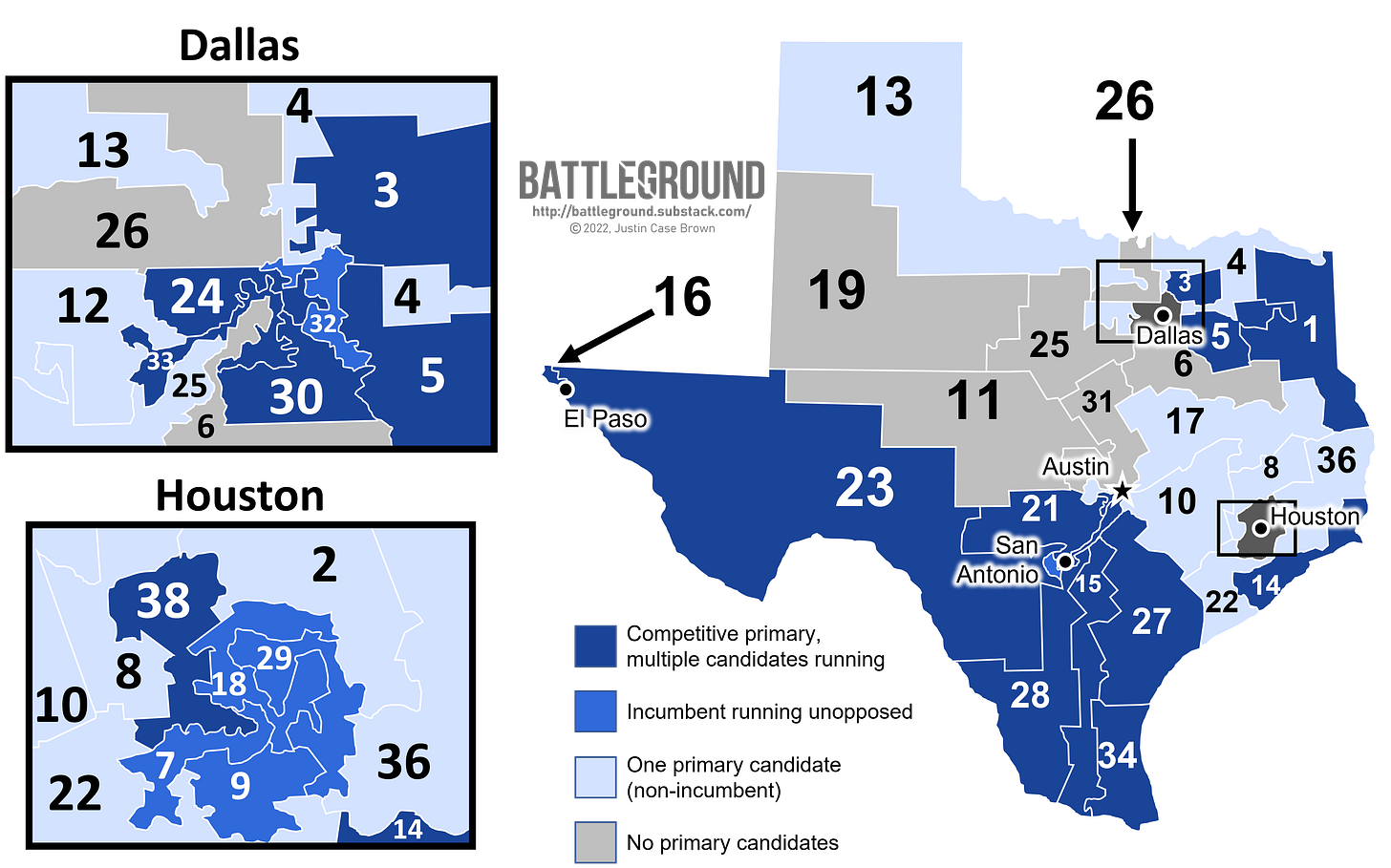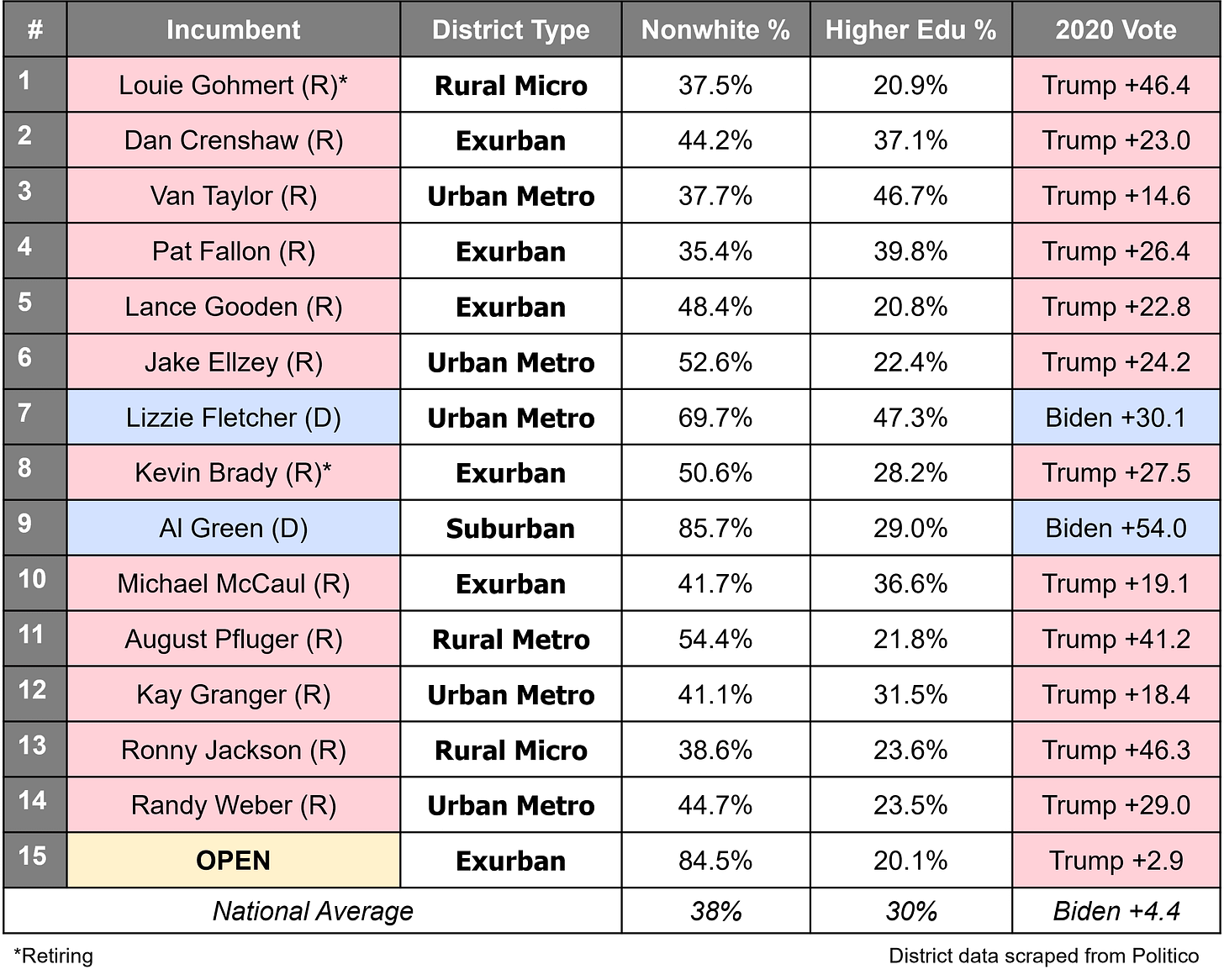Texas: Kicking Off the 2022 Elections
Democrats may be a little too obsessed with South Texas.

Topline Takeaways
Texas kicks off the 2022 election season as it is the first state to hold its primaries this cycle on March 1, 2022. (Today!)
This election is stirring controversy as it is the state’s first to be held under Republicans’ new restrictive voting laws. The state also has several outstanding lawsuits against its new congressional district map. Some have called the map the worst racial gerrymander in the country.
Democrats failed to find primary candidates for six districts across the state. Meanwhile Republicans successfully fielded at least one primary candidate in all of the state’s 38 districts.
Click here for an interactive map of Texas’s new congressional districts.
Texas-Sized Trouble
There’s a lot to swallow in Texas right now. Today, voters are heading to the polls to vote in the state’s primaries. This election is the first to be held under the state’s new voting rights law. Both voters and election officials have already encountered difficulties with casting and processing votes due to the onerous new restrictions.
Meanwhile, the congressional map used to hold this election is being challenged in court for racial gerrymandering, including a federal lawsuit brought forth by the Department of Justice. Texas grew by 4 million people over the last ten years and the census found that 95% of that growth was due to the state’s exploding nonwhite population. Roughly half of the state’s growth can be attributed to the Hispanic population alone. This growth earned Texas an extra two seats in the US House. Despite being a primary driver of the state’s growth, Hispanics received no extra majority-minority districts in redistricting while the state gained one new majority-White district.
These actions, all spearheaded by Texas Republicans as they currently hold a trifecta in state government, were intended to restore faith in the state’s election system. Instead, the moves have further eroded trust due to the myriad ways the new voting procedures disenfranchise many groups across the state.
For now, I’m tabling a deeper dive into Texas’s alleged gerrymander while the courts work through their cases. I felt it was much more timely to instead look at the primary field as a nod to today’s elections. With most of Texas’s districts becoming less competitive following redistricting, primaries are increasingly important in determining who eventually holds a House seat. To make matters worse, some districts failed to hold a primary today because no candidates filed to be placed on the ballot. Let’s walk through Texas’s primary landscape and see how some House members can “win” an election without ever facing a challenger.
Texas’s 2022 House Democratic Primaries

Since the 2020 election, Democrats have been sounding the alarm in South Texas. Many voters living along the southern border rely on the oil industry and border security for their primary source of jobs. Recent progressive calls to defund the police and fight climate change have soured voters on Democrats and have allowed Republicans to make inroads in these districts. Moderate Democrats like Henry Cuellar (TX-28) play well here and have historically seen success in this region. Yet his opposition to many Democratic ideals (e.g. his stance on abortion) that makes him popular in the district also exposes a rift he faces within his party. Progressive candidate Jessica Cisneros challenged Cuellar in 2020 by running to his left and lost in the primary by less than 3,000 votes. Rather than backing down, she’s forged ahead with her 2022 campaign and may produce an upset once all the votes are counted. (Whether she can win over a fairly conservative district in the general election is another question entirely.)
Further down the border in TX-34 a whopping seven candidates filed to run in the state’s most crowded Democratic primary. They’re running to unseat another moderate Democrat, Vicente Gonzalez Jr., who only won his district by a 3-point margin in 2020. This symbolizes the laser-focus both the state and national parties have on consolidating resources to defend districts in South Texas. While defending the region from Republican challengers is laudable, Democrats are doing so at the expense of fielding candidates in other regions. Democrats will have no candidate on the ballot this year in six different House districts in Texas, practically gifting those seats to Republicans.
This also means that three Republican House incumbents: August Pfluger (TX-11), Jodey Arrington (TX-19), and Roger Williams (TX-25) may be re-elected to Congress without ever facing a challenger in this election cycle. All three are running unopposed in their respective primaries, guaranteeing them a spot in the general election come November. With no Democratic challengers, their only hurdle to holding onto their seat would be a popular independent candidate, a true rarity in today’s political landscape.
Texas’s 2022 House Republican Primaries
Since Texans currently support the Republican party in larger numbers than the Democratic party, it wasn’t as difficult for Republicans to field candidates in every district across the state. There were only three districts where Republicans fielded a single, non-incumbent primary candidate (all are expected to lose in November as they’re running in deep-blue districts.) Meanwhile, seven incumbent Republicans will sail straight through to the general election as they’re running unopposed in their respective primary. For those that are keeping an eye on the power of an endorsement from Donald Trump, the former president has not endorsed any primary challengers to incumbent candidates in Texas.
District Breakdown
Leftover Links
Texas is also holding primaries for state executive roles like the governorship. See why most are expecting today’s elections to lead to an Abbot-O’Rourke match-up in November.
Dive deeper to see how a “race-blind” approach to redistricting led to the state’s alleged racial gerrymander.
Why does this San Antonio district boundary look so bizarre?




